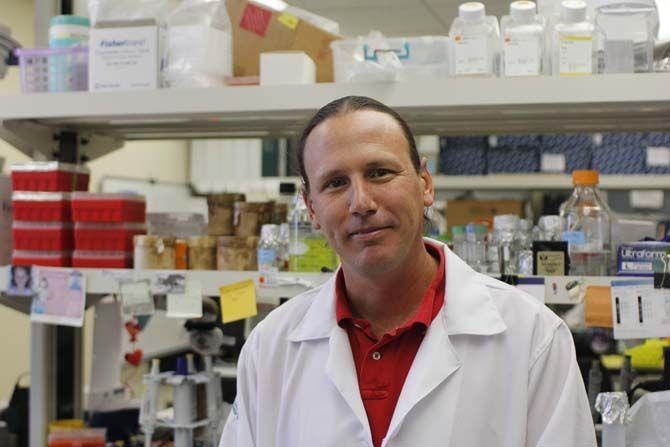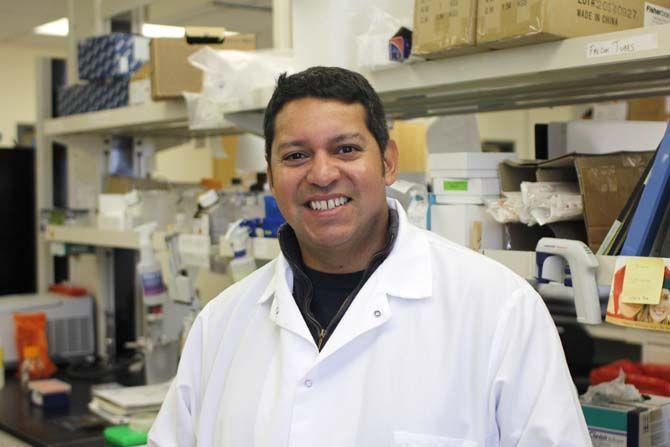A $1.6 million grant renewal from the National Institutes of Health is helping pathobiological sciences professor Kevin Macaluso and associate professor Juan Martinez improve treatment and diagnosis of rickettsial pathogenic diseases and infections through biomedical research.
Rickettsial infections are bacterial diseases which produce mild flu-like symptoms and are transmitted through the bites of arthropods such as ticks with no specific hosts. If left untreated or misdiagnosed, the effects of the disease on humans can become severe.
In the United States, there are roughly 5,000 rickettsial disease and infection cases annually reported to the Centers for Disease Control and Prevention. Macaluso said there are a large number of additional cases that go unreported because patients receive treatment.
The grant, which Macaluso said is an essential contributor to his research, was initially awarded in 2009, making LSU one of the top 10 NIH-funded schools for infectious diseases.
The 2015 renewal will last Macaluso and Martinez — co-investigator of the rickettsia project — until 2020, according to a School of Veterinary Medicine news release. It supports the costs associated with research for the project, as well as the salaries for three PhD candidates and two research associates.
Macaluso said his primary research goal is to improve diagnostics, as well as preventative medicine and therapeutics because the role of rickettsial proteins in tick infection is currently unknown. His interest in this type of pathobiological research lies in the ticks’ blood feeding capabilities, which stimulates the rickettsia bacteria transmission.
“While getting basic blood meals, these ticks can transmit bacteria, viruses and parasites. It’s neat ecology,” Macaluso said. “They get their protein from human blood. It’s a requirement for how insects live.”
According to Macaluso, the grant will allow his team to determine whether or not the molecules Martinez studies are important to the tick infection’s survival, something other researchers in the field have been unable to identify.
Students, according to Macaluso, were pivotal in the process of the grant’s development.
“We teach and mentor them to be very independent…They are actively involved in the whole process,” he said. “The school and Office of Research and Advanced Studies have also been very supportive.”
Martinez, who has worked with Macaluso on vector-borne disease research since 2012, said LSU has a collaborative research environment that makes executing a project of this size possible. It is something that drew him to LSU after spending seven years in the University of Chicago’s microbiology department.
“We have the synergy and knowledge of vector-borne disease experts in ecology and rickettsia and bacterial genetics, and it’s that melting of the expertise and disciplines which, to our knowledge, is a fairly unique research team in the United States and the world,” Martinez said. “I don’t know of anyone else who does this interface at one institution.”
Martinez said LSU has made a concerted effort to invest in biomedical research, not just at the SVM, but throughout other scientific departments. These investments and grants allow faculty to conduct high-level research because they support funding for instruments like microscopes and technical expertise.
PhD candidate Victoria Verhoeve, who is on staff in Macaluso’s lab, said research funding is a luxury many institutions are unable to enjoy. It is what allows scientists at LSU to say “Let’s try this,” and follow through with new and “novel” research, she said.
“There isn’t really a better place for this than LSU,” Verhoeve said. “There’s lots of opportunities to get involved, and we get to become the champions of our projects.”
NIH awards $1.6 million grant renewal to LSU professors studying pathogenic diseases
By Kaci Cazenave
October 6, 2015
Nicholas Martino
Kevin Macaluso, PhD, Mary Louise Martin Professor in the Department of Pathobiological Sciences, receives grant renewal to support research of spotted fever components transmitted by ticks, on Tuesday, Oct. 06, 2015, at LSU School of Veterinary Medicine.
Nicholas Martino
Juan Martinez, PhD, LSU School of Veterinary Medicine Associate Professor, is the co-investigator on the grant renewal to support research of spotted fever components transmitted by ticks, on Tuesday, Oct. 06, 2015, at LSU School of Veterinary Medicine.
More to Discover











